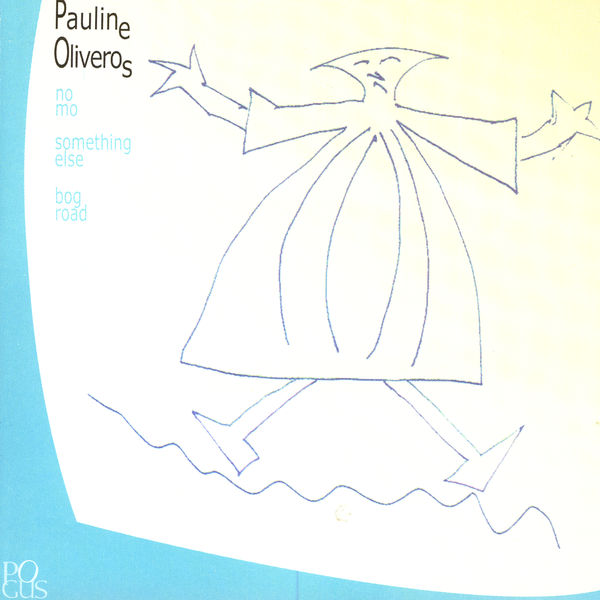
Musique illimitée
Écoutez cet album en haute-qualité dès maintenant dans nos applications
Démarrer ma période d'essai et lancer l'écoute de cet albumProfitez de cet album sur les apps Qobuz grâce à votre abonnement
SouscrireProfitez de cet album sur les apps Qobuz grâce à votre abonnement
Téléchargement digital
Téléchargez cet album dans la qualité de votre choix
Langue disponible : anglais
No Mo is a collection of three early Pauline Oliveros pieces, the first two, No Mo and Something Else, were recorded at the University of Toronto in 1966 and Bog Road on a Buchla system at the Mills Tape Music Center in 1967. They reveal Oliveros as an electronic music pioneer in both a practical and an artistic sense; these works often find now-familiar electronic sounds in settings of uniquely Oliverine provenance, created in the near half-hour-long form she prefers, consisting of slowly evolving structures. The best of the three, Something Else, is unfortunately a fragment of only 14 minutes' duration. Oliveros establishes an eerie, static, slowly changing background with fractional foreground elements darting in and out of the landscape. In a psychological sense, Something Else is a very effective piece, capped off by a gist of sadness as the master tape skitters out of the playback -- there is no more to be heard.
Conversely, No Mo is more challenging to listen to as it is made up of some rather distorted, very high frequency sounds. A few minutes into it and your ears get accustomed to the piece, though it can be a rough ride for the opening. A little more subdued is the Buchla-generated Bog Road, which is enjoyable overall, although the concluding moments can't help sounding like a Space Invaders game. It's not Oliveros' fault that her vintage 1967 experimental creativity shares some commonality with mainstream noises from the future tense, but even though this is true it goes to demonstrate the sententiousness of her foresight.
© TiVo
Vous êtes actuellement en train d’écouter des extraits.
Écoutez plus de 100 millions de titres avec votre abonnement illimité.
Écoutez cette playlist et plus de 100 millions de titres avec votre abonnement illimité.
À partir de 12,49€/mois

Pauline Oliveros, Composer, MainArtist
(C) 2001 Pogus (P) 2001 Pogus
Pauline Oliveros, Composer, MainArtist
(C) 2001 Pogus (P) 2001 Pogus
Pauline Oliveros, Composer, MainArtist
(C) 2001 Pogus (P) 2001 Pogus
Chronique
No Mo is a collection of three early Pauline Oliveros pieces, the first two, No Mo and Something Else, were recorded at the University of Toronto in 1966 and Bog Road on a Buchla system at the Mills Tape Music Center in 1967. They reveal Oliveros as an electronic music pioneer in both a practical and an artistic sense; these works often find now-familiar electronic sounds in settings of uniquely Oliverine provenance, created in the near half-hour-long form she prefers, consisting of slowly evolving structures. The best of the three, Something Else, is unfortunately a fragment of only 14 minutes' duration. Oliveros establishes an eerie, static, slowly changing background with fractional foreground elements darting in and out of the landscape. In a psychological sense, Something Else is a very effective piece, capped off by a gist of sadness as the master tape skitters out of the playback -- there is no more to be heard.
Conversely, No Mo is more challenging to listen to as it is made up of some rather distorted, very high frequency sounds. A few minutes into it and your ears get accustomed to the piece, though it can be a rough ride for the opening. A little more subdued is the Buchla-generated Bog Road, which is enjoyable overall, although the concluding moments can't help sounding like a Space Invaders game. It's not Oliveros' fault that her vintage 1967 experimental creativity shares some commonality with mainstream noises from the future tense, but even though this is true it goes to demonstrate the sententiousness of her foresight.
© TiVo
À propos
- 1 disque(s) - 3 piste(s)
- Durée totale : 01:03:53
- Artistes principaux : Pauline Oliveros
- Compositeur : Pauline Oliveros
- Label : Pogus
- Genre : Pop/Rock Rock
(C) 2001 Pogus (P) 2001 Pogus
Améliorer les informations de l'album
 Pourquoi acheter sur Qobuz ?
Pourquoi acheter sur Qobuz ?
-
Streamez ou téléchargez votre musique
Achetez un album ou une piste à l’unité. Ou écoutez tout notre catalogue en illimité avec nos abonnements de streaming en haute qualité.
-
Zéro DRM
Les fichiers téléchargés vous appartiennent, sans aucune limite d’utilisation. Vous pouvez les télécharger autant de fois que vous souhaitez.
-
Choisissez le format qui vous convient
Vous disposez d’un large choix de formats pour télécharger vos achats (FLAC, ALAC, WAV, AIFF...) en fonction de vos besoins.
-
Écoutez vos achats dans nos applications
Téléchargez les applications Qobuz pour smartphones, tablettes et ordinateurs, et écoutez vos achats partout avec vous.



